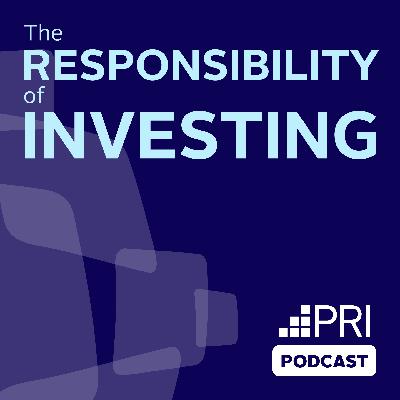The Climate - Nature Nexus: Why Investors Must Think Systematically
Description
In this episode, Nathan Fabian, Chief Sustainable Systems Officer at the PRI, explores the deep interconnection between climate and nature and what it means for investors. Joining him are Laura Bosch, Senior Engagement Specialist at Robeco and member of the Advisory Committee for the PRI’s Spring Initiative, and Graham Stock, Managing Director at RBC BlueBay Asset Management and co-chair of the Investor Policy Dialogue on Deforestation (IPDD). Together, they unpack the financial and systemic risks of biodiversity loss, the emerging opportunities in sustainable investment, and the growing need for investors to act on the climate–nature nexus during COP30 and beyond.
Overview
The conversation begins by defining the climate-nature nexus as more than a conceptual link it’s an integrated system of feedback loops that shape economies, markets, and societies. Graham explains how deforestation and ecosystem degradation feed directly into sovereign credit risk, citing Brazil’s forests as a clear example of natural capital underpinning national economic stability. Laura expands on how biodiversity loss and climate change are mutually reinforcing crises that require investors to tackle transition and physical risks together.
Both guests highlight a shift in the industry: from separate approaches to climate and nature, to joint strategies that embed nature-based metrics within climate targets and net-zero roadmaps.
Detailed Coverage
- Risks and Opportunities: Investors must assess both the risks of ecosystem degradation and the opportunities from nature-positive transitions. Integrating climate and nature goals is becoming standard in frameworks such as the Net Zero Investment Framework and GFANZ guidance.
- Portfolio Application: Graham outlines how sovereign bond investors now evaluate nature-related risks such as water stress and deforestation alongside traditional macroeconomic indicators, using these insights to shape portfolio exposure and engagement priorities.
- Corporate Action: Laura details Robeco’s approach to assessing corporate transition readiness for both climate and biodiversity, combining financial materiality with forward-looking analytics. Their “traffic light” model identifies leaders and laggards, informing investment decisions and stewardship priorities.
- Balancing Trade-offs: The discussion explores how investors can navigate trade-offs between climate and nature goals - for instance, balancing the climate benefits of electric vehicle production with the biodiversity impacts of mining.
- Reversing Negative Impacts: Case studies highlight solutions such as regenerative agriculture, silvopasture, and precision farming to restore land and reduce emissions while sustaining productivity.
- Collaborative Engagement: Graham and Laura describe the impact of large-scale initiatives such as the IPDD, Nature Action 100, and the PRI’s Spring Initiative—each mobilizing investors to engage with governments and corporations on deforestation and biodiversity loss.
- COP30 and Beyond: Both guests underscore the importance of the upcoming COP30 in Brazil, where the Tropical Forest Financing Facility (TFFF) could redefine climate finance by channeling $125 billion to forest protection.
Find out more about the PRI at COP30 by visiting www.unpri.org/responsible-investment/road-to-cop30
Chapters
00:00 – Introduction: The climate–nature nexus
02:32 – Graham Stock on integrating nature risk into sovereign credit
06:09 – Laura Bosch on connecting biodiversity and climate strategies
11:24 – How nature-based targets are reshaping portfolios
16:46 – Tools to assess transition readiness for climate and nature
21:23 – Reversing nature loss in agriculture and land use
24:09 – Investor engagement and the IPDD
29:52 – Collaborative initiatives: Nature Action 100 and PRI’s Spring
38:32 – Looking ahead to COP30 and the Tropical Forest Financing Facility
45:42 – The responsibility of investing: closing reflections
Disclaimer
This podcast and material referenced herein is provided for information only. It is not intended to be investment, legal, tax or other advice, nor is it intended to be relied upon in making an investment or other decision. PRI Association is not responsible for any decision made or action taken based on information on this podcast. Listeners retain sole discretion over whether and how to use the information contained herein. PRI Association is not responsible for and does not endorse third parties featured on in this podcast or any third-party comments, content or other resources that may be included or referenced herein. Unless otherwise stated, podcast content does not necessarily represent the views of signatories to the Principles for Responsible Investment. All information is provided “as is” with no guarantee of completeness, accuracy or timeliness, or of the results obtained from the use of this information, and without warranty of any kind, expressed or implied. PRI Association is committed to compliance with all applicable laws. Copyright © PRI Association 2025. All rights reserved. This content may not be reproduced, or used for any other purpose, without the prior written consent of PRI Association.





